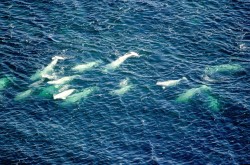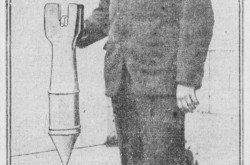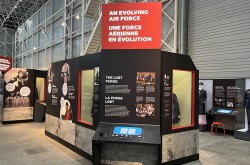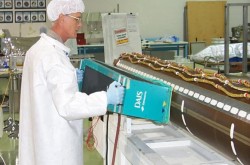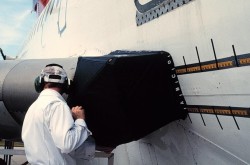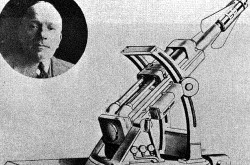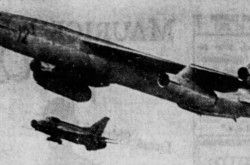Legacy Series Episode 6 - The Road Back
In this wrap-up episode, veterans describe coming home what their lives were like after the war. In addition, Cadet Andy and Captain Johnny C discuss the war’s consequences. Student participants also talk about what working on the Legacy Project has meant to them. Through their interviews with RCAF veterans, they describe gaining a greater understanding of the realities of war in the air, and its consequences on the ground — from the home front to Europe and Asia. As they filmed and assembled the footage into the six full-length episodes of the Legacy Project, the students gained a better understanding of what the men and women had both suffered and accomplished, and were proud to be able to connect with the Greatest Generation.
Transcript
0:13
As a young fella, you’re twenty or twenty-one years old.
0:18
You’ve just left your mother, who told you what to do: wipe your nose or whatever else.
0:25
Then you got told where to go and to wipe your nose by these corporals, sergeants, and so on.
0:33
You’re in the Army: you’re told what to do, all the time, everywhere.
0:37
The war ended.
0:38
Now, you’re not going to be told what to do.
0:42
Now what?
0:43
What happens now?
2:02
I’m very upset—because I thought my number
2:06
was due—because somebody else’s number came up, and I had a lower number.
2:12
So I went to the sergeant, and I said, “They didn’t call my number.”
2:17
He says, “So what?” or whatever he said.
2:20
And I said, “Well, can you tell me?”
2:22
He said, “What’s your number?”
2:23
“R266054.”
2:26
He pulls the paper and says, “It’s not on here!”
2:31
I said “Well, when am I going?”
2:33
“Haven’t any idea.
2:34
We’ll call you.”
2:36
That was it: nobody knew when you were going.
2:40
So when I did hear, I was told that I would more than likely not go home till Spring.
2:48
So I spent the good part of a year on the Continent,
2:52
working at headquarters and waiting to go home.
2:56
Which was, you know . . . the war was over; I had no patience.
3:00
None of us had patience.
3:03
You know, the question was: well, what do we do now?
3:08
The station commander wanted to keep control over us (laughs), in case we didn’t go too
3:15
wild and so on from partying a bit.
3:18
So he organized sport days.
3:21
That kept us busy and occupied and so on—smart move.
3:27
After the war was over in Europe, they had thousands of us in England
3:35
that they didn’t know what to do with; so they had holding units.
3:40
I was there about two weeks or so.
3:43
I was told that I was now the new stage electrician for a RCAF show that was
3:53
travelling in Europe, and everything else.
3:56
I had the best six months of my Air Force career right there.
4:02
We felt important, you know.
4:06
Everybody knew there was a show in town, and they were going to play a performance—tonight.
4:14
It was a variety show.
4:16
We did sort of the opening number.
4:20
We did a tap routine: one where we dressed up like cowboys, cowgirls.
4:25
We did different types of dancing.
4:29
This was our opening number, and we had these jackets on that shone in the dark.
4:33
It was black—see, the first show was blackouts, but we were all-clear.
4:38
So we had this costume on, and this jacket.
4:41
And somebody yelled, “All-clear!”
4:43
And the curtain opens, and we were just in these teddies and black stockings.
4:47
Well, the whistles and the hoots and the hollers were so loud that we couldn’t hear the music.
4:56
So they changed the costumes.
5:01
I wouldn’t trade it for anything.
5:04
It was the best time there was, and we were treated so well, you know.
5:09
You hear of girls joining up into the Armed Forces: their parents wouldn’t let them go,
5:14
because they figured there was a lot of hanky-panky or whatever that was going on—
5:20
nothing like that at all.
5:26
Where are the props?
5:27
No propellers.
5:29
It’s a jet fighter.
5:30
Hmm.
5:32
I knew we were testing them at the end of the war…No propellers.
5:36
What will they think of next?
5:38
No pilots.
5:39
That will be the day.
5:41
Good to be back home, Johnny?
5:45
It's easy, I’ll tell ya that.
5:48
It took awhile.
5:49
Waiting and waiting.
5:50
And then more waiting.
5:51
A lot of blanket drills in between.
5:54
Blanket drills?
5:55
Naps, Andy.
5:56
Naps.
5:58
If they didn’t discharge me when they did, I was going to snatch up my old Lanc and fly
6:02
back to Canada on my own.
6:04
Couldn’t wait to get home, eh?
6:05
No!
6:06
Could you?!
6:07
I couldn’t wait to see my girl and my ma my pa, brothers, sisters… but…
6:14
But what?
6:18
But I think, I’m going to miss…
6:20
Miss your old crew, right?
6:22
Yeah, them for sure, but
6:27
there’s something about the fighting.
6:31
About cheating death.
6:35
The rush of it all.
6:38
I’m going to miss that.
6:40
But now you have your whole life ahead of you?
6:43
That’s what I’m scared of Andy.
6:46
That seems a lot scarier than what I’m leaving behind.
6:50
Wonder why that is?
7:09
We were glad to be home.
7:12
The next morning, we arrived at Central Station in Montreal, and my whole family was there:
7:18
my mother, my father, my sisters.
7:22
I was coming home.
7:25
My God, what a joy!
7:27
It was a moment that we’ll never forget!
7:32
It was nice to get home.
7:33
It was kind of a let-down, though, because the excitement was over.
7:37
The war is over (laughs).
7:39
When we landed in Canada, they had a big band playing and all that, and we all got off.
7:44
The people were all there at Nova Scotia.
7:49
and... ah... There was a train on the tracks right there, and so, one of the guys that looks after each
8:00
cabin—or whatever you want to call it— there’d be about
8:03
twenty guys on that one section.
8:07
We all had a single seat; when we went overseas, there would be three guys in that seat.
8:13
And we had no papers, here we got, “Where are you from?
8:16
Toronto?
8:16
Here’s the Toronto paper.”
8:18
And so they'd say
8:20
And when it came time for us to sleep at night, those things made into a bed
8:24
for us, so we could sleep.
8:28
He would say, “Go down to the end of the room and have a smoke, and you can get a beer
8:32
down there, and I’ll make up your beds.”
8:35
And I said, “Well, we can make our beds.”
8:37
“No, no, that’s my job.”
8:39
He was an elderly man.
8:41
So he made the beds.
8:42
He says, “I want you to leave your shoes out here, so I can shine them for you.”
8:46
I said, “Are you joking?
8:48
Nobody ever shines—” “I want you to do that.
8:51
He says, Look at me, I never went to the war.
8:54
I want to do something for you guys.”
8:57
I could cry when I hear things like that.
9:00
Anyways, we would go to a special cabin, or train, to eat.
9:08
That never happened before.
9:09
They’d say, “What do you want?
9:11
Three, four eggs? Six eggs?
9:13
How many do you want?
9:14
How do you want them cooked?”
9:15
You know, the cook would say, “He wants them this way: just slightly over.
9:20
OK.
9:21
How about the bacon?
9:22
How many bacon do you want?
9:23
Do you like it this way or that way?“
9:25
And toast!
9:26
Ohhh, he knows how to make— And you know, it’d be running down your cheeks.
9:32
You’d say, “My God!”
9:34
You know?
9:35
But that was “The war was over.”
9:38
We were home.
9:40
We were saying, “Geez, we never had milk, we never had butter;
9:45
never had jam or anything like that.”
9:48
So landing home was just— It was home, we knew it.
9:56
Getting home was kind of interesting, because I had phoned Mum from Ottawa.
10:04
I said, “I think I can probably make the Owen Sound, the Alfred train,” that goes
10:11
up from Toronto.
10:13
When it was due to arrive, the whole village was out to greet me.
10:21
And of course, somehow, I couldn’t make that train, and I didn’t phone.
10:29
But I hitchhiked up from Toronto.
10:32
It was the day after when I got up there.
10:36
And our place had a long lane—a country lane, you know.
10:44
He drove me up the lane, and stopped and I got out.
10:49
And Mom was there on the porch, ready for me.
10:53
It was great.
11:00
Settling into home life?
11:02
Getting back to the old routine?
11:04
Everyone’s been great.
11:06
When I first got home there were lots of pats on the back, you know.
11:10
A parade for all of us who fought.
11:12
Free drinks. That sort of thing.
11:15
But, life goes on.
11:18
Some of the vets I met, they have their whole life mapped out for them.
11:23
All types of government assistance to help them out.
11:29
But to tell you the truth Andy,
11:35
I’m kinda in the soup.
11:40
Like I’m flying through a dense fog all the time.
11:49
I’m jumpy when it comes to loud noises.
11:55
On edge all the time.
11:59
I don’t sleep well…
12:03
I wish I were over there.
12:05
So I wouldn't have to think about it all the time…
12:11
I just want to fly missions.
12:16
That’s what I’m good at.
12:18
Flying missions.
12:19
That’s what I do.
12:21
Did. Johnny
12:21
That’s what you did.
12:24
You know, you might have what they call PTSD.
12:28
PT what?!
12:29
Post-traumatic stress disorder.
12:31
Those are some fancy five-dollar words you’re spitting out there Andy.
12:35
In English?
12:36
PTSD is a mental disorder some veterans get from fighting in wars.
12:41
No.
12:42
(laughs)
12:46
No!
12:47
I’m not a nut case!
12:51
That's not what I'm saying.
12:52
It can be controlled.
12:52
Enough!
12:53
We’re done talking about it.
12:56
I’ll be…I’m fine.
13:02
And you don’t tell anyone.
13:03
You hear me!
13:24
I went to law school, I stayed for awhile, but I could see
13:27
after, I couldn’t settle down.
13:29
I guess my mind was someplace else.
13:31
So I left there, and I started to work.
13:34
Finally, I worked for Blue Cross.
13:36
That eventually became OHIP.
13:40
So I spent my working days with OHIP.
13:42
I went right back to university.
13:44
You know, the army supported my wife and me ‘til I graduated.
13:50
I walked into the Bell office in Montreal—a big recruiting office, right inside the door.
13:57
And I went over to the little girl and said, “I was thinking of applying for a position.”
14:03
She said “What are your qualifications?”
14:05
Well, I said just the right words: “I just got my diploma from McGill,
14:11
and before that I was in the Air Force, in radar.”
14:15
She said, Is that anything to do with wireless?”
14:17
I said, “It’s completely wireless!”
14:19
She says “Well. We’re looking for people
14:21
with a university degree who have experience in wireless!
14:26
Would you wait a minute?”
14:27
So she went and got her boss, and he took me up to the big boss of the department they
14:32
wanted me to go into.
14:33
He said, “Could you start tomorrow?”
14:36
“Well maybe. I could start next week!”
14:38
And so I started the following Monday.
14:40
And thirty-six years later: “Thank you, radar; you got me in the door.”
14:45
I taught Morse code to the Scouts, at a time when women were not allowed into the Scout
14:52
troops at all.
14:54
But, because of the necessity of the boys to learn Morse code,
15:01
I was permitted into the troop.
15:05
Got home, went into the university, and graduated as a civil engineer.
15:15
And then right straight into work.
15:18
I had been thinking of going to visit CIDA, and ask if they had something that I could do.
15:26
The very day that I was planning to see them, I got a call
15:31
from this general, saying, “How would you like to go to Burma?”
15:37
I thought about it a long time—one second—and I said, “Yes!”
15:42
I went to de Havilland—in 1953, I think it was.
15:50
And I was there until I went
15:57
to join Ken Molson, who was the curator in the National Aviation Museum.
16:04
It was a wonderful time that I first realized that this is what I wanted to do:
16:10
help to preserve airplanes and, in my own time, paint what I was to paint, which was aviation scenes
16:23
of historic events in particular.
16:27
Guess what?
16:28
I’m flying again.
16:29
That’s great.
16:30
Where? With who?
16:32
I’m flying a busher for a hunting and fishing lodge.
16:35
That’s sounds about right.
16:36
Yeah.
16:37
I’m taking rich muckety mucks up North so they can bag a bear, or a moose, and put its
16:43
stuffed head on their mantelpiece.
16:44
And then brag about it over whiskey and cigars.
16:47
Sounds gross.
16:49
Which part?
16:50
The stuffed animal heads part.
16:52
Who are we to judge.
16:54
I’m just glad I found something.
16:56
So many of them who were over there haven’t.
17:00
Some of them were real war heroes.
17:02
Chest full of medals.
17:06
Now forgotten.
17:27
When the war started, I was just a kid in
17:31
the ninth grade.
17:33
When the war ended, I was a lieutenant in the Air Force.
17:37
A full grown man, even if I was only twenty years old.
17:41
When I looked around me, I thought I was pretty smart—and pretty lucky.
17:49
I had seen London, and Paris, and Algiers and things like that,
17:55
I was pretty full of myself when came back.
17:59
It wasn’t hard to get me to talk about what I’d seen.
18:04
I don’t like talking about the war as such—the killing and so on, that went on.
18:11
That was our job: we did it, and there was no question.
18:18
We couldn’t argue about it; we just did it.
18:21
But the other part—the playing part—was great.
18:26
And I told everybody about that.
18:30
But I think, as time goes on, people will forget.
18:35
I think after the war was over—the First World War was over,
18:39
say in the twenties—people forgot that.
18:41
Like we have a tendency to forget our last war here.
18:47
The other thing is that things are moving much faster now than they were
18:50
twenty years ago, or forty years ago.
18:52
People are much busier doing other things.
18:59
Well, it’s been said, and it’s true: “History is thirty seconds ago!”
19:05
I want people to always remember the historical aspect of what they do,
19:14
and what other people do.
19:16
It’s important to preserve.
19:19
When you think of it, the German people are human, too.
19:25
And it wasn’t the German people who started the war.
19:31
It was their leaders, who felt they could
19:37
have more land or create a greater presence in the world.
19:47
But you meet German people now, and they’re just the same as you and I.them
19:55
I work with them at the senior’s centre.
19:58
They’re great.
20:03
Now that you’re back and working, what do you miss the most about the war?
20:10
I miss my crew.
20:13
The rest is fading.
20:15
But my crew, we had some good times!
20:20
Close shaves too.
20:23
We try to keep in touch, but I live up North and they’re all over the country…
20:29
it’s not the same.
20:31
Probably will never be?
20:33
No, probably won’t.
20:36
Best to put that road behind us now and move on.
20:41
It was something though.
20:42
Something worth repeating?
20:45
That’s not up to me Andy.
20:48
But who better to tell others why we shouldn’t have wars, than veterans.
20:52
You think anyone will listen?
21:13
War doesn’t really solve anything in the final analysis.
21:17
It’s just a lot of people have their lives ruined, and are killed and maimed. and I. . .
21:25
I think there should be more emphasis on peace.
21:28
The whole philosophy should be that war is bad.
21:33
There’s no doubt that our war had to be fought, because Hitler and Mussolini were
21:41
going to take over the world—and they nearly did.
21:45
But there is a point where you should be able to stop that ahead of time.
21:49
I don’t know what it is.
21:54
Well, love each other, I think love each other, I think I would say
21:59
because that solves everything.
22:01
Love saves everything.
22:05
But that’s practically impossible; so I don’t think that’s going to happen.
22:12
I realize that we have differences, but if we can only
22:22
look at the other person’s point of view,
22:26
maybe we would avoid a lot of conflict and heartache.
22:34
It’s very difficult to constantly feel you are the only one who knows what’s right.
22:48
Just realize: listen to them, and then judge whether you are right, or whether the other
23:01
person might have a tiny bit of knowledge, too.
23:08
It would be nice to see the world become peaceful, and everybody started getting along with one
23:16
another, instead of having to fight with one another.
23:20
Fight for peace.
23:22
I think that’s the only thing.
23:23
I think war is a terrible thing.
23:26
And, as I said, we lost thousands—well, we lost millions altogether during the war.
23:34
It’s terrible, and I would do everything to avoid it.
23:43
Somebody who wants to conquer somebody—you can try to negotiate it, and you can threaten.
23:52
But if they don’t stop, you’ve got to stop it.
23:57
And you should be prepared, and never be not prepared.
24:05
Keep up your Army, your Air Force, your Navy.
24:15
That’s as much as I think I can say.
24:19
You’ve got to be able to fight back.
24:23
You’ve got to be able to fight back.
24:27
I thought, “Well, let’s go back and live happily ever after!”
24:31
I really did.
24:32
When I got home:
24:35
that’s done. I’ve been to a war; it’s terrible.
24:39
Whatever, whatever, whatever, but it’s over!
24:42
But, we’ve had a war ever since.
24:48
I hate it.
24:55
You know Andy experience teaches you a lot of things in life.
25:00
My only hope is that future generations will see what we did in the war,
25:05
the sacrifices, the accomplishments,
25:08
and that they learn something from it.
25:11
Or else, it would be all for not.
25:14
And that would be a shame.
25:17
I believe they will Johnny.
25:19
I have a good feeling about it.
25:25
That’s good.
25:51
What I would say to the veterans that went through World War Two?
25:55
I would say, “You guys are awesome to be able to just drop everything.”
26:00
‘Cause most of these people were high-school students.
26:02
They were nineteen, they were seventeen, when they went off.
26:05
To be able to say goodbye to your family, to be able to pack up and go fight this war
26:10
for your country—I think that’s something that is really cool.
26:14
Because nowadays, a lot of people don’t really stand up for themselves, let alone
26:19
a whole country.
26:21
And for them to be able to do that—and either to survive or die in the battle—
26:27
that is amazing that they have this tale to tell.
26:33
These veterans make the Second World War more authentic, closer to people.
26:42
These pilots have seen a bomb bay door open above them, and risked having thirty bombs
26:46
drop on them, if they didn’t do something.
26:48
They’ve been shot at, and have had to parachute down to survive, when the rest of their crew died.
27:00
What happened during the Second World War is intense.
27:02
And I feel more connected to it now.
27:07
Listening to Mr. Gélineau’s interview, I feel like I know him now.
27:11
Like, I’ve never met the guy before, but I feel as if I know him.
27:16
It’s kind of amazing.
27:18
These guys and girls have some great stories behind them that need to be told,
27:25
need to be put on record.
27:27
And it would be a complete shame if they just got lost.
27:31
I don’t know . . . it’s just something I find fascinating
27:33
just hearing their stories, you know.
27:35
You watch a movie, or read a book, but when you actually hear it from someone who’s
27:40
experienced it, it’s totally different.
27:44
They are only veterans’ stories.
27:46
They’re not some guy who read about these things in a book.
27:49
These people have lived through it.
27:51
It’s real; it’s honest.
27:54
When they speak, you can feel the emotion in their voices, and in their eyes.
27:59
This is their actual lives.
28:02
It’s important for younger generations to never forget what older generations
28:07
did for us, because we wouldn’t be where we are.
28:10
And it’s just important to know that war is really not a good thing.
28:14
And a lot of people died, and I hope it doesn’t happen again.
28:18
Once hearing all the stories from the actual people that lived through it, it hits a lot
28:24
harder, and it makes you care a lot more about what happened.
28:28
As I remember in high school, it was kind of basic: learn the dates, learn the locations, study
28:33
for your exam, and that was pretty much it.
28:36
But to sit there and listen to everything they have to say, you know, you get attached
28:41
to these people—to these, you know, these fighters.
28:45
Even though some of them were just nurses, fighter pilots or just navigators,
28:54
each one of them has played an important role in our history.
28:57
To be able to make an emotional connection with the person, to tell future generations,
29:03
I think that is a really cool thing.
29:05
You know, I’m really thankful that they were there.
29:10
You have two generations facing each other.
29:13
On one side, a generation that lived through bombings and had to go to war.
29:18
On the other side, a generation that’s holding an iPhone and has everything at its fingertips.
29:26
I think we have a lot to learn from these men and women.
29:28
We need to take the time to give them a voice.
29:31
We need to remember them.
29:35
We need to pay attention to what they’re telling us.
29:38
A lot of veterans want to pass on what they know.
29:40
We’re losing more and more of them as time goes on.
29:44
It’s like our last chance to hear them tell their stories.
29:52
Young people need to understand the past
29:53
in order to better understand what’s going on today.
30:03
Just knowing about what these soldiers did— what the war was about, why it happened—
30:08
would help educate the younger generation against having it happen again.
30:15
History is something that should be remembered and never forgotten.
30:22
They were young, as we are young.
30:25
They served, giving freely of themselves.
30:30
To them we pledge, amid the winds of time, to carry their torch and never forget.
30:39
We will remember them.
30:41
We will remember them.



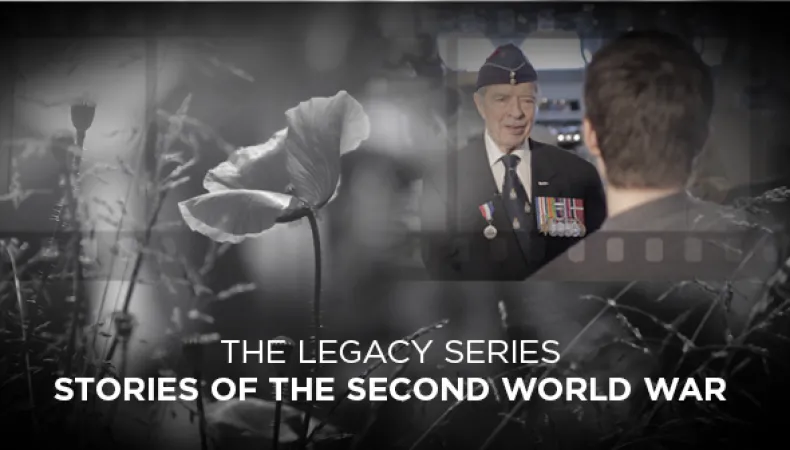

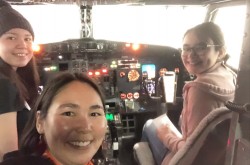
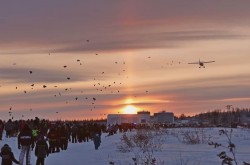
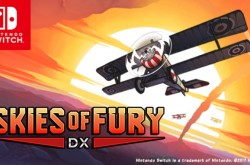
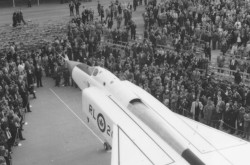
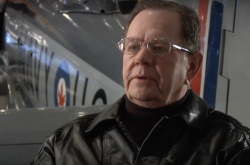




![A block of photographs showing some of the people involved in the bombing of beluga whales in the estuary and gulf of the St. Lawrence River. Anon., “La chasse aux marsouins [sic]. » Le Devoir, 15 August 1929, 6.](/sites/default/files/styles/thumbnail_7/public/2024-09/Le%20Devoir%2015%20aout%201929%20page%206.jpg?h=584f1d27&itok=TppdLItg)
